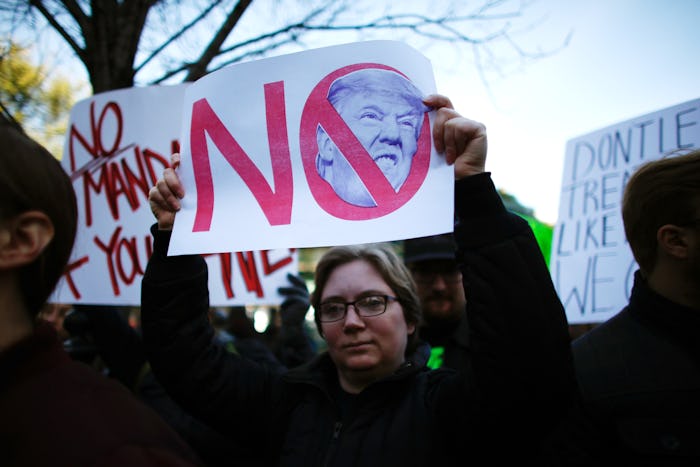News

Why Wearing A Safety Pin To Show Solidarity Isn’t Enough In A Post-Trump World
For minority groups in this country, the fact that the American people voted Donald Trump, who's endorsed by those who support the KKK, into power sends a very specific message: We don't want you here. To combat this and to distance themselves from Trump's racist rhetoric and the hate crimes some of his supporters have perpetrated throughout the country since his unexpected win, some (mostly white) people have begun to wear safety pins as a sign of solidarity. But wearing a safety pin isn't enough to establish yourself as an ally or to earn trust from marginalized people in a post-Trump world. Not at all.
Donald Trump's looming presidency means that for many people, life is about to get harder. Millions could lose their health insurance if Trump and his Republican-majority government repeal President Obama's Affordable Care Act; the American school system could end up in tatters if he follows through with his stated plan to abolish the Department of Education. But for immigrants, Latinos, African Americans, Muslims, and many other groups that Trump has insulted, belittled, and vilified over the course of his campaign, so much damage is already done: Hate crimes and other racially fueled incidents of violence, verbal abuse, and intimidation are already proliferating throughout this country as people's basest white supremacist inclinations emerge and find legitimacy with Trump's impending ascension to the Oval Office.
And white people — who made up 70 percent of the voting electorate and were the only demographic Trump won over Hillary Clinton over Hillary Clinton — have a responsibility to do everything in our power to combat the seemingly irreparable harm that rose from the fact that Donald Trump is now the face of what our country stands for. Not all white people voted for Trump, of course, and many vehemently reject his views. And some of them want to show that they are the "good ones" by using a shorthand signal to transmit their true feelings to both neighbors and strangers of color.
It's a nice sentiment, but ultimately ineffective, designed more to assuage white guilt, according to Huffington Post contributor Christopher Keelty, than to truly reach out to people who will be the most devastatingly impacted by the Trump presidency. For all the same reasons that people tend to embrace such a stance like wearing a safety pin (it's unobtrusive, it's noncontroversial, it's easy), it's unlikely to affect any real change other than to excuse white people from taking real action, like actually interacting with communities of color to find out how they can be of service, donating time and money to nonprofits that benefit them, or getting involved with groups that will lobby against anticipated Trump initiatives like mass deportations.
Basically, white people who consider themselves "safe" have to earn their safety pins. Simply clipping one onto our sweaters alone does not make us allies or friends to people of color.
Because the safety pin is a symbol, and nothing more. It's not real action. And it's popularity in lieu of real action that made Ijeoma Oluo, editor-at-large of The Establishment, seriously question its worth, as she wrote in an essay on the subject:
I questioned why the most popular act of solidarity would be silent, why marginalized people would have to look for it. I questioned why, in times like this, people weren’t shouting. I questioned why so many people who would never wear a Black Lives Matter shirt are jumping to put on a safety pin.
So, go ahead and wear your safety pins. Wear them when you volunteer to help The Southern Poverty Law Center, Council on American-Islamic Relations, the American Civil Liberties Union, or another worthy causes; clip it on when you're supporting minority-owned businesses. Take it along while you seek out marginalized voices and work to really understand them. Just don't ever expect a reward or recognition, and realize that the work is never done.